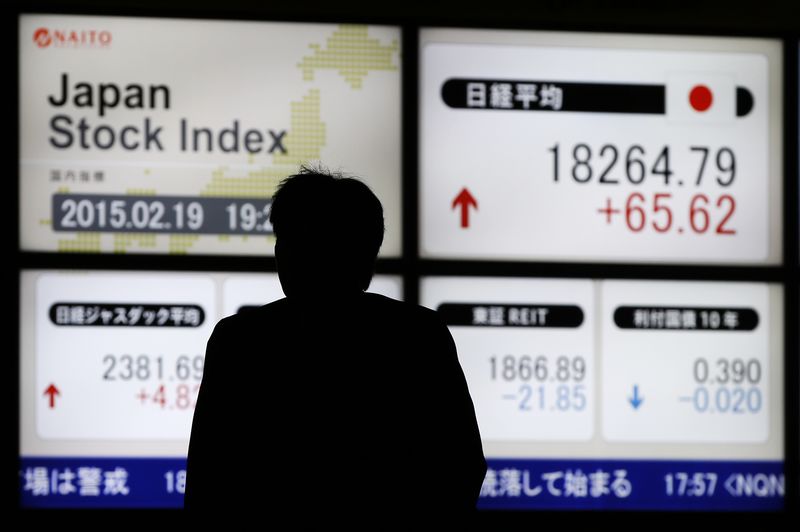Investing.com-- Most Asian stocks were a mixed bag on Monday, with Chinese shares under pressure after the People’s Bank unexpectedly kept lending rates on hold, while outperformance in Japanese markets continued.
Which Asian equities are the best buy right now? Find out with Investing Pro. For an extra 10% discount, use Coupon: Canada2024.
Don’t miss the New Year’s sale, for up to 60% off. Only until Jan 31.
Sentiment towards regional markets remained wary in anticipation of more key economic cues this week, including Chinese gross domestic product data and and Japanese inflation. Beijing’s reaction to the Taiwan presidential election also kept traders on edge.
Japan’s Nikkei 225 was the best performer among its peers for a fourth straight session, rising 0.5% to a new 34-year high as the prospect of an ultra-dovish Bank of Japan kept traders heavily biased towards local stocks.
Japanese consumer price index (CPI) data due later this week is expected to show a sustained decline in inflation, setting a dovish tone for the BOJ when it meets later in January.
The Taiwan Weighted index rose 0.5% after Democratic Progressive Party (DPP) candidate William Lai won the Presidential election over the weekend- largely maintaining the status quo for the island in its resistance towards reunification with China.
Lai, along with the DPP, has constantly reiterated Taiwan’s independence- which has been a key point of ire for Beijing. The Chinese government reiterated its calls for reunification over the weekend, and any more action from Beijing will be in close focus ahead of Lai’s official inauguration in May.
Chinese stocks pressured by rate-cut disappointment, Q4 GDP awaited
China’s Shanghai Shenzhen CSI 300 and Shanghai Composite indexes moved little after steadying from early losses, while Hong Kong’s Hang Seng index rose 0.2% after recovering from a 0.5% loss earlier in the session.
The People’s Bank of China (PBOC) unexpectedly kept its medium-term lending rates on hold on Monday, as it struggles between shoring up economic growth and stemming further losses in the yuan. The move heralds no changes to the PBOC's key loan prime rate later in January.
Still, Chinese stocks took some support from a liquidity injection by the PBOC.
Monday's move showed that Beijing has limited headroom to further loosen monetary conditions and support growth- which could bode poorly for a fragile post-COVID economic recovery.
Focus this week is largely on fourth-quarter GDP data, due on Wednesday. While growth is expected to have surpassed the government’s 5% target for 2023, a bulk of that increase is also expected to come from a low basis for comparison from the prior year.
Chinese stocks were the worst-performing Asian markets in 2023, losing between 10% to 20% as a post-COVID economic rebound failed to materialize.
Broader Asian markets were muted, as sentiment remained strained by the Middle East conflict. A U.S. market holiday is also expected to make for scant trading cues.
Most regional stocks were nursing some losses from last week, after hotter-than-expected U.S. inflation data spurred some doubts over early interest rate cuts by the Federal Reserve.
Australia’s ASX 200 was flat, while South Korea’s KOSPI fell 0.2%.
Futures for India’s Nifty 50 index pointed to a flat open, with local stocks largely set to track their regional peers in trading sideways. Indian wholesale price index inflation is due later on Monday, coming after data on Friday showed a smaller-than-expected increase in CPI inflation.
